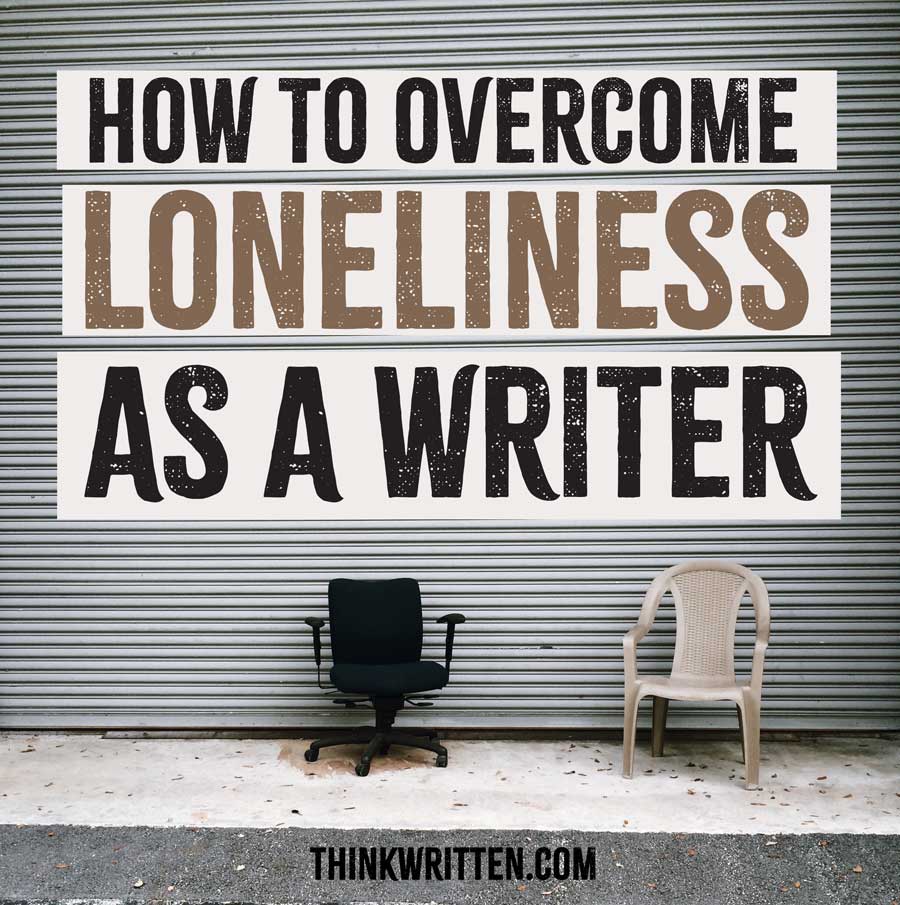We may receive a commission when you make a purchase from one of our links for products and services we recommend. As an Amazon Associate we earn from qualifying purchases. Thank you for support!
Writing can be a lonely and isolating passion – here are 10 ways to overcome loneliness and isolation as a writer.

Writing is a skill that requires creativity and technical know-how. It takes someone with a great deal of experience and exposure to write exceptionally well. Different writing styles require various skill sets. Hence, for the creative juices to flow, a calm and quiet environment is a writer’s best friend.
Finding a spot where one can focus and work undisturbed is like a healthy soil where imagination flourishes. At the same time, this ideal environment for writing can take a toll on your own mental and emotional well-being.
Lonely Writer Syndrome
Writing in itself is a solitary experience. An act accomplished only by you and your trusted ally – your computer. In order to meet target deadlines, and sometimes just because of utter concentration, being cooped up indoors for several days and nights is nothing unusual.
It is a sacrifice one must take in order to get all ideas, thoughts, transferred into paper. After accomplishing such a feat, there is a sense of accomplishment, happiness, or satisfaction that overwhelms a writer and motivates them to do it all over again if they have to.
Most people say all writers are introverts as a result. When in reality, even those who have gotten used to being alone and in the quiet for long periods of time still experience bouts of loneliness from time to time. There are various reasons a writer can feel depressed or lonely.
Perhaps it’s the inability to socialize with people who understood what being a writer entails, being unable to find the time to form a bond and establish a connection or other rationale. One thing’s clear though – there’s no need to dwell on the situation. It’s time to act and remember the points raised below to overcome loneliness as a writer.
Here’s How to Overcome Loneliness as a Writer:

1. Keep a Healthy Mindset
You are not alone. What you do has an impact on other people’s lives. You matter.
Living and writing is similar in certain ways. You get to breathe, eat, sleep and live life on your own standards. However, living your life with intention means connecting with other people, committing to a lifestyle within your means and creating meaningful relationships.
Living and writing is a journey you don’t do just for yourself. Your ultimate goal as a writer is for someone to read your work, learn from it, feel inspired by it, and eventually change their lives for the better.
If you get tired from doing what you do, rest. Allow your body to feel pain, exhaustion or weariness and when you are ready, stand up and do what you do best – write! Write your thoughts, feelings and use your emotions to inspire and motivate you.
2. Connect and Interact

There are others just like you who have the same goals. There are others who may not be like you but appreciates what you do and accepts you for who you are and what you aim to accomplish. The key is in finding these types of people and reaching out. But the first step is to be visible. You won’t be meeting anyone if you don’t make an effort.
Join writing groups – online or face-to-face. Reply to comments. Answer questions from newbies without expecting anything in return. Enlist in Webinars. Welcome out of the blue conference calls. Participate in group activities. Attend meetups. Do a video call with a friend. Create or support a cause. Engage in social media challenges.
There is an endless list of ways you can meet new people and expand your circle to combat loneliness as a writer. Don’t stop though after merely getting to know them. Make a consistent effort to get to know them more and establish a relationship.
Remember, building relationships is a two way street. You need to put in as much effort as the other person if you’re keen on maintaining a bond. Keep an honest and open communication.
3. Stay Toxic-Free
What do you do with the people who don’t do you any good? Let them go. That’s right. Value yourself. Appreciate yourself more. Steer away from people or activities that bring you sadness, anxiety or apprehension. Invest in those that make you feel empowered, energized and positive.
4. Get Outside

You are not bound to the chair you usually sat in or the room you’re stuck in. There are several places you can still write but still have a few people around to inspire you and encourage simple interactions.
Move about. Find a new coffee shop to hang out every week or so. Check out a new restaurant in the area. Bask in the sunlight as you write while lying down on your stomach on the green lawn in a park nearby.
What’s even better? Find a friend who can hang out with you without feeling pressured to carry on a conversation. Having someone physically present without any expectation of small talk is a great way to write and not be alone.
5. Give Back

Volunteer and spend your vacant time to help a non-profit organization. Offer dog walking. Serve meals at a homeless shelter. Spend time at a nursing home. Clean up trash in your community.
Knowing that you can do something, no matter how small of an act, to contribute and help others brings about a sense of accomplishment and pride.
6. Vary your Routine
Take a shower in the afternoon instead of in the morning. Wear something different. Dab a little powder on your face. Brush your hair. Look at the mirror and appreciate the change.
Sometimes just taking a few minutes break to take care of yourself and change things up from your normal routine does a lot with your outlook and helps you stay focused and motivated.
7. Get a Pet or a Plant

Get a plant, a dog, cat, bird or fish to take care of. Having something else to take care of other than yourself can alleviate feelings of loneliness. A pet or plant both offer companionship with minimal supervision.
8. Learn Something New
Give yourself something to aim for, something you would need to invest your time and energy in so that you funnel your focus and energy to doing something worthwhile versus dwelling on your emotions.
Learn a new language. Look up how to knit. Join a dance class. Sing to your heart’s content while discovering how to play a guitar. Try out a new recipe.
Focus on a new goal and be relentless in achieving it. Diverting your emotions to task-oriented goals can help you stay objective and can bring about self satisfaction from achieving it.
9. Draw
As a writer, you rely a lot on words to express what you think and how you feel. Channel your emotions differently by attempting to draw.
Feel free to use colors, pens, markers, or anything that can help draw out your emotions without feeling any pressure. It doesn’t matter what it looks like. Don’t focus on what you are making but rather on how the activity makes you feel. Grab a pen and paper and scribble away!
10. Play a Game
Install a new game on your phone or laptop or try a new online game. When you are starting to feel stuck, overwhelmed, and isolated, hold off on whatever you are doing and take a few minutes to play the game. Chat with some of the players. Take a break, enjoy and have fun.
Solitude vs Isolation

Studies conclude that the less time an individual spends with others, the more he puts himself at risk for feeling lonely and depressed. While writers are more exposed to this risk since they put in a lot of work while being alone most of the time, there are several ways you can fight it off.
There is a difference between working in solitude and working in isolation. One pertains to simply being alone per one’s own choosing while the latter implies a negative connotation of being alone without wanting or meaning to.
Some people can feel isolated when they are within a group of people who don’t appreciate them as they are and have interests that are not meeting their own.

In order to not feel this way, one must invest time and effort in being visible, interacting with random people and selecting which groups they are most likely to be accepted for who they are and what they do, participating in activities that allow them to become better versions of themselves and be comfortable in their own skin.
It’s important to partake in activities you don’t normally get involved in if it means bringing you in the open and letting you meet new people.
Keep a healthy mindset and take action. Instead of feeling unwanted and alone, take appropriate measures to change the situation you are in. There is always something you can do to take advantage of it and bring about the best version of yourself.
Allow yourself to feel, acknowledge and react to the current circumstances. You are not a robot. Your feelings are normal. However, what you do given how you feel weighs more. Don’t rush yourself into making a decision and plan how to live your life more purposely.
Do you have any tips for overcoming loneliness as a writer? Share your comments and how you deal with feelings of isolation in the comments section below!





